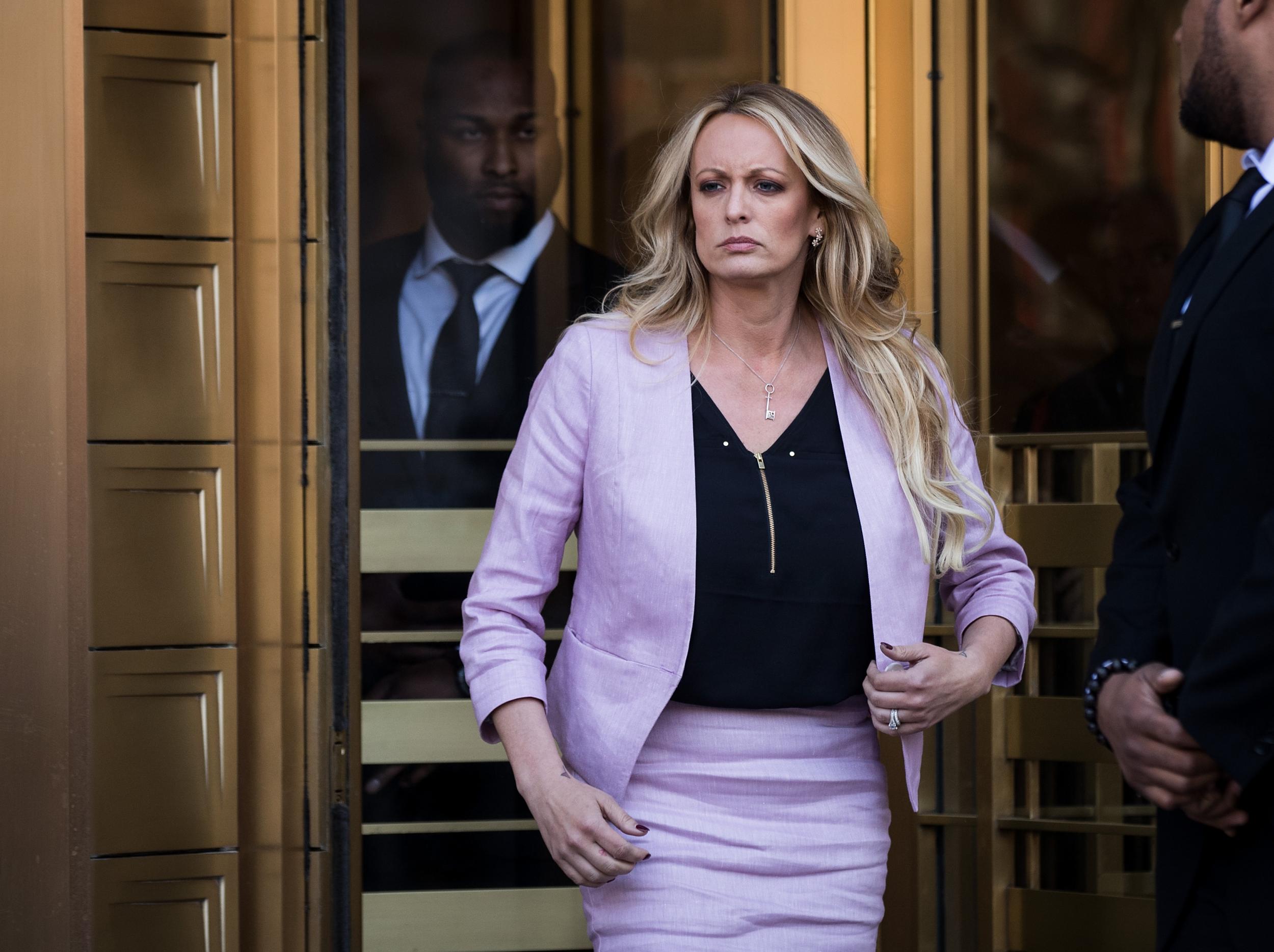Rival nuclear buttons, ‘s***hole countries’ and Stormy Daniels
In the seventh instalment of our series recapping an unprecedented presidency, Joe Sommerlad looks at a crude and chaotic start to 2018 that brought international offence


Donald Trump began 2018 with a bang, launching into a fresh assault on the dignity of Chairman Kim on 2 January with another truly immortal tweet.
“North Korean Leader Kim Jong Un just stated that the ‘Nuclear Button is on his desk at all times’,” the president posted. “Will someone from his depleted and food starved regime please inform him that I too have a Nuclear Button, but it is a much bigger & more powerful one than his, and my Button works!”
While Trump and Kim’s relationship began to thaw gradually into a wary friendship, the former set about an action that generated little interest at the time but which would have interesting resonances come November 2020.
He disbanded the Voter Fraud Commission on 5 January, which he himself had formed to investigate the fact that he had lost the popular vote to Hillary Clinton when he took the presidency with an electoral college win of 306-232, alleging without evidence that illegal ballots and interference were rife.
Widely assumed to be a distraction from the ongoing investigation into the role Russia might have played in his victory and seen by some as an attempt to disenfranchise minority voters, the president’s panel was folded without reaching any conclusions, a development he blamed on Democrat-led states refusing to cooperate and regarded as preferable to protracted legal battles.
Had he allowed it to proceed and exorcise the phantom of voter fraud once and for all, Trump could at least have saved himself a few sleepless nights and his attorney Rudy Giuliani a dye-sweat embarrassment or two in trying to make the case for its (non-existent) recurrence four years on.
By 8 January, Trump was incensed anew when journalist Michael Wolff’s book Fire and Fury hit shelves.
Taking its title from the president’s threat against Kim, the book would go on to top the New York Times bestseller list, with readers delighting in its portrait of dysfunction in the West Wing.
As the president sought to rubbish Wolff’s “phony book” by arguing it had been commenced with “zero access” authorised (untrue), politicos savoured passages quoting the since-departed Steve Bannon, branding Trump’s daughter Ivanka “dumb as a brick” and denouncing her brother and husband’s Trump Tower meeting with Natalia Veselnitskaya as “treasonous” and “unpatriotic”.
Trump himself was portrayed throughout as terminally incompetent and unfit for office, with adviser Sam Nunberg recorded struggling to get past the fourth amendment in his efforts to explain the constitution to his boss, such was the impatience he encountered.
Further embarrassment was to come when The Washington Post reported on 11 January that the president had complained in a behind-closed-doors meeting with senators Lindsey Graham and Dick Durbin about immigrants coming to the US from Haiti, El Salvador and Africa, expressing a preference for Norwegians and asking: “Why are we having all these people from s***hole countries coming here?”
The slur provoked international outcry but, incredibly, this was not even the first time he had been accused of making racist remarks of precisely this stripe.
Just a month earlier, the New York Times had carried an account of his claiming in a June 2017 meeting that people arriving from Haiti “all have Aids” and that recent Nigerian immigrants would never “go back to their huts” if they were permitted to stay.
Nor would it be his last offence. In June 2019, Trump would cause a similar upset even closer to home by branding the troubled city of Baltimore, Maryland, “a disgusting, rat and rodent-infested mess”.
The slur provoked international outcry but, incredibly, this was not even the first time he had been accused of making racist remarks of precisely this stripe
Another scoop followed on 12 January, this time from The Wall Street Journal, reporting that Trump’s lawyer Michael Cohen had paid out $130,000 in “hush money” on his boss’s behalf to porn star Stormy Daniels to stay silent over an affair she alleged she had had with him in 2006. Cohen would later confirm the story and say he was never reimbursed.
Trump’s crass conduct and chaotic administration would be temporarily forgotten in the aftermath of the Parkland shooting in Florida on 14 February, when gunman Nikolas Cruz, 19, entered the Marjory Stoneman Douglas High School and killed 17 people, injuring 17 more.
Until, that is, the president suggested – amid the mood of national mourning over the worst school shooting since Columbine in 1999 – that the solution was armed teachers: more guns in classrooms, not fewer.
He followed that up by declaring on Twitter on 18 February that the FBI “missed all of the many signals sent out by the Florida school shooter” because “they are spending too much time trying to prove Russian collusion with the Trump campaign”.
His response to the tragedy was a great deal less sensitive and eloquent than that of Emma Gonzalez, David Hogg and their fellow teen survivors, who subsequently formed Never Again MSD to lead national demonstrations and lobby Washington for legislative solutions to the gun violence epidemic.
March brought further staff turnover at the White House, with Trump saying goodbye to director of communications and Mooch replacement Hope Hicks, trade adviser Gary Cohn, secretary of state Rex Tillerson and national security adviser HR McMaster all in the space of a month.
Hicks, a former fashion model, would return to his side to make an inadvertent but crucial intervention in the 2020 election campaign. And according to Wolff, Cohn and McMaster had privately labelled Trump “dumb as s***” and a “dope” respectively and grown utterly exasperated with his dogged refusal to read daily briefing documents.
NBC likewise reported that Tillerson had called the president a “moron” after his dismissal of Pentagon generals at that ill-tempered Oval Office meeting in July 2017.
McMaster, incidentally, would be replaced by John Bolton, a notorious foreign policy hawk, whom Trump would hire in spite of his deep dislike of the man’s crumb-brush moustache. It was a decision he would live to regret.
Those outgoing Cabinet members were not the only ones Trump was quickly losing patience with, however. He was growing ever-more antsy about Robert Mueller’s secretive, methodical Russia investigation and said so.
An FBI raid on Cohen’s office on 9 April was too much for him, the president hitting out at the investigator for conducting “an attack on our country in a true sense. It’s an attack on what we all stand for.”
As the agents gathered up Cohen’s records on Daniels and other murky matters, the president had to be talked down from sacking both Mueller and deputy attorney general Rod Rosenstein.
Read the full The Trump Review series here
Join our commenting forum
Join thought-provoking conversations, follow other Independent readers and see their replies
Comments


Bookmark popover
Removed from bookmarks